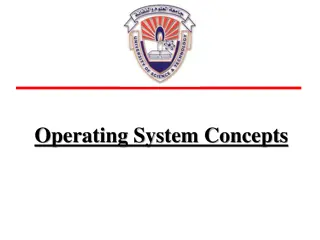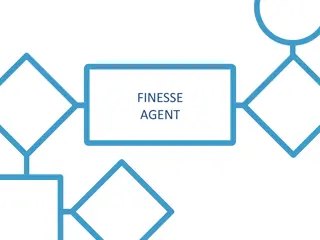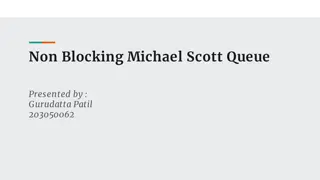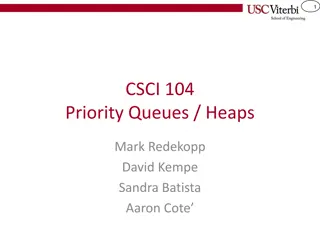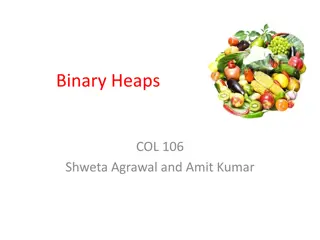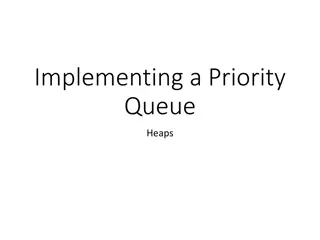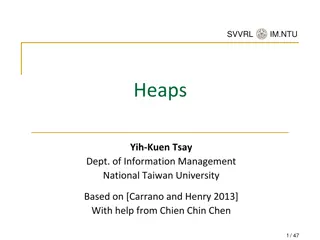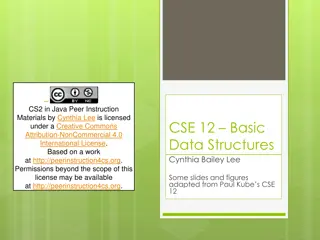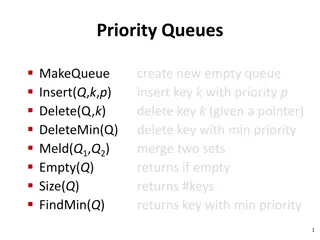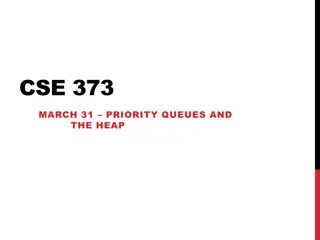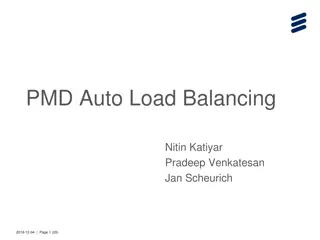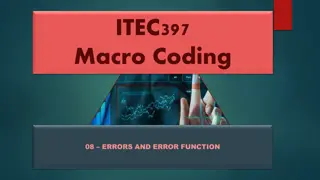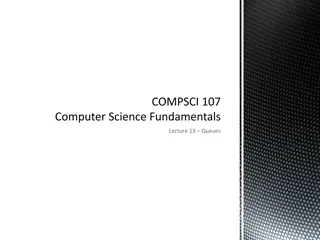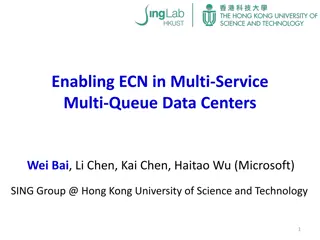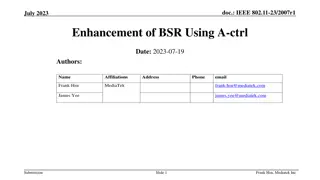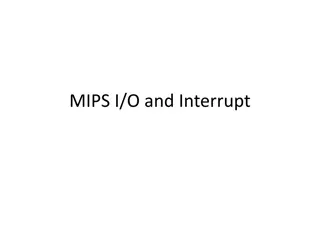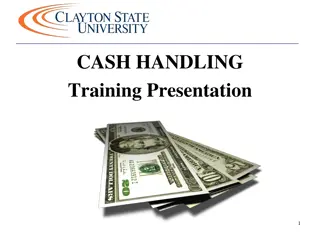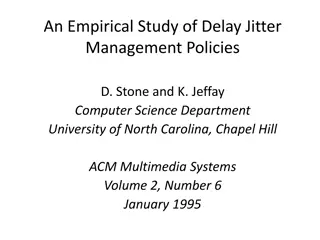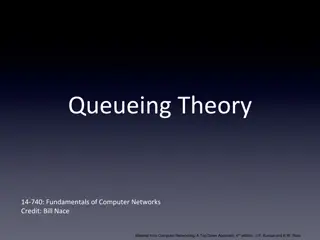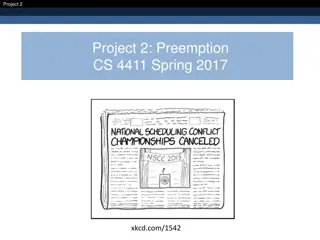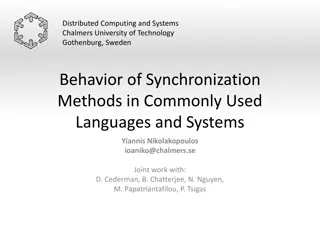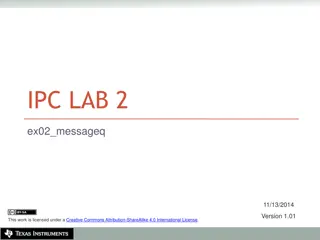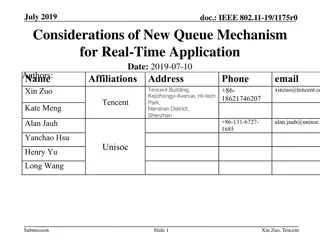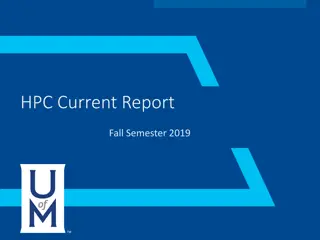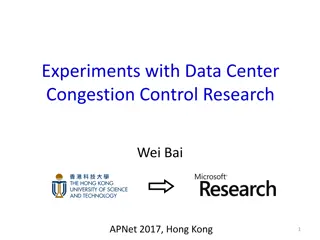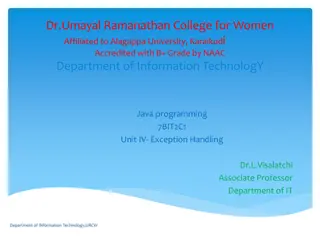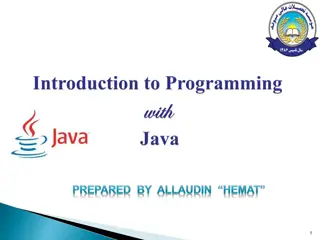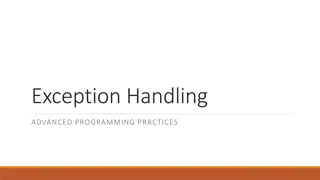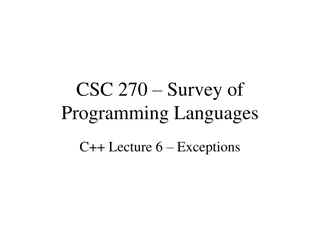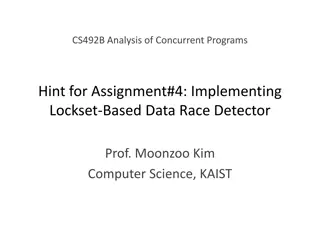Material Handling Excavators Market Analysis, Size, Share, Growth, Trends Foreca
The Global Material Handling Excavators market shapes the construction and infrastructure development sectors. Material handling excavators, robust and versatile, play a pivotal role in the efficient movement of heavy loads, reshaping the operational paradigms in various industries.
0 views • 9 slides
Federal Energy Regulatory Commission Transmission Update - Nov. 3, 2023
FERC, led by Director Rob Thormeyer, regulates natural gas wholesale facilities, interstate pipelines, onshore LNG facilities, wholesale electric market rates, and more. The Commission consists of five appointed Commissioners overseeing key initiatives like transmission planning proposals and interc
0 views • 14 slides
Small Animal Restraints and Safe Handling Practices in Veterinary Technology
Importance of safe practice when working with small animals includes preventing harm, reducing injury, and minimizing stress. Proper animal handling methods and tools are crucial for the safety of both animals and handlers. Common methods of handling different species, demonstrating appropriate anim
1 views • 22 slides
Understanding Queuing Theory and Its Applications in Operations Research
Queuing theory is a mathematical study of waiting lines, or queues, commonly applied in operations research to predict queue lengths and waiting times. It helps businesses make decisions regarding resource allocation for efficient service provision. This field also encompasses queue discipline and E
1 views • 10 slides
Best Practices for Cash Handling and Receipt Management
Enhance your cash handling and receipt management practices with essential guidelines such as separation of duties, internal controls, and proper handling of funds and transactions. Discover key insights on authorized departments, standards for receipts and funds handling, and ways to share responsi
1 views • 43 slides
Cash Handling Training Certification Overview
This overview provides information on cash handling training certification for satellite cashiers and occasional cash handlers at CSU. It covers the purpose of the training, responsibilities of cash handling locations, training requirements, and physical security protocols for handling university ca
3 views • 27 slides
Manual Handling Toolbox Talk - Importance and Prevention of Injuries
Manual handling injuries are a prevalent issue in workplaces, leading to significant work-related musculoskeletal disorders. Employers must assess and mitigate risks associated with manual handling to ensure employee safety and well-being. Employees also have responsibilities to follow safety protoc
0 views • 16 slides
Understanding CPU Scheduling in Operating Systems
In a single-processor system, processes take turns running on the CPU. The goal of multiprogramming is to keep the CPU busy at all times. CPU scheduling relies on the alternating CPU and I/O burst cycles of processes. The CPU scheduler selects processes from the ready queue to execute when the CPU i
1 views • 26 slides
Finesse Agent and Supervisor User Guide
Learn how to use the Finesse Agent and Supervisor interface efficiently. Discover key features such as changing agent states, handling calls, transferring calls, and accessing queue statistics. Log in with your user ID and password to start managing calls and providing exceptional customer service.
0 views • 17 slides
Understanding the Non-Blocking Michael Scott Queue
The Non-Blocking Michael Scott Queue, presented by Gurudatta Patil, is a thread-based data structure where threads help each other in managing a queue efficiently. Threads collaborate to add nodes at the tail and remove them from the head, ensuring smooth operation even in a non-empty queue scenario
0 views • 17 slides
Understanding Priority Queues and Heaps in Data Structures
Priority queues prioritize item retrieval based on value, contrasting with traditional queues that follow a first-in-first-out approach. Priority queues efficiently manage items based on their importance, often utilized in scenarios like emergency rooms or air traffic control. Heaps, a form of binar
0 views • 20 slides
Understanding Priority Queues and Heaps
Priority queues differ from regular queues by maintaining an ordering of items based on priority rather than first-in-first-out. Items in a priority queue are assigned priority values and the highest priority item is removed first. Different data structures can be used to efficiently insert and remo
0 views • 54 slides
Understanding Binary Heaps: Efficient Data Structure for Priority Queue Operations
Explore the concept of binary heaps, a specialized type of binary tree that allows for quick retrieval of the smallest (or largest) element. Learn how binary heaps excel in finding the minimum value, essential for priority queue applications in operating systems, event simulations, and more. Compare
2 views • 34 slides
Implementing a Priority Queue with Heaps
Learn about implementing a priority queue using heaps. Priority queues are essential data structures that maintain a special ordering property. The use of binary trees and heaps is explained in detail, focusing on maintaining shape and heap properties during insertions.
0 views • 57 slides
Understanding Heaps: A Complete Binary Tree Data Structure
Introduction to heaps, a special type of complete binary tree used for efficient priority queue implementation and sorting. Explains the concept of maxheap and minheap, along with operations like isEmpty, getNumberOfNodes, getHeight, peekTop, add, and remove. Includes visual aids and definitions to
5 views • 47 slides
Priority Queues in Java: Implementation and Use Cases
Explore the concept of priority queues in Java, covering implementations using unsorted and sorted linked lists, as well as heaps. Learn about the differences between a queue and a priority queue through reading quizzes and discover various priority queue implementation options. Dive into priority q
1 views • 42 slides
Understanding Heap Sort and Binary Search Tree Concepts
Learn about Heap Sort for sorting elements in ascending or descending order, Priority Queue as a data structure supporting key operations, Binary Trees with recursive definitions, and exercises involving priority queue operations. Explore the concepts through visual aids and examples provided in the
0 views • 18 slides
Priority Queues: Operations and Implementations
Priority queues are data structures that allow efficient insertion, deletion, and retrieval of elements based on their priority. This information-rich content covers various aspects of priority queues, including ideal times, binomial queues, Dijkstra's algorithm for single-source shortest paths, and
0 views • 11 slides
User-Centric Parameters for Call Handling in Cellular Mobile Voice Service
The ITU Regional Standardization Forum for Africa held in Kampala, Uganda in June 2014 introduced ITU-T Recommendation E.807, focusing on the definitions and measurement methods of user-centric parameters for call handling in cellular mobile voice service. The recommendation outlines five key parame
1 views • 15 slides
Understanding Priority Queues and Heaps in CSE 373 Lecture
Today's lecture in CSE 373 covers the Priority Queue Abstract Data Type (ADT), the properties of heaps, and their implementations. Key topics include the completeness property of heaps, different priority queue implementations such as the binary search tree for faster insert and find operations, and
0 views • 21 slides
Automatic Load Balancing Proposal for PMD Port Queue Assignment
This proposal discusses dynamic port queue assignment strategies for PMDs in network environments. It covers both static and dynamic assignment methods, such as round-robin and cycles-based algorithms, to ensure uniform load distribution. The proposal introduces an automatic load balancing feature,
0 views • 20 slides
Understanding Error Handling Techniques in VBA Programming
Error handling is crucial in VBA programming to catch and manage runtime errors effectively. This article explores various error handling techniques such as On Error GoTo statement to prevent program crashes and enhance the reliability of applications. By using structured error handling, developers
0 views • 17 slides
Understanding Queues in Computer Science: Principles and Implementations
Explore the concept of queues in computer science, focusing on ordered collections of data following the FIFO principle. Learn about queue ADTs, implementations in Python, and delve into a simulation of a Printer Queue problem. Discover how to model printing tasks as random events and analyze the im
0 views • 15 slides
Enhancing Data Center Performance with ECN-Based Transports
This study focuses on enabling Explicit Congestion Notification (ECN) in multi-service, multi-queue data centers to cater to diverse network requirements. ECN-based transports like DCTCP and DCQCN achieve high throughput and low latency by allowing end-hosts to react to ECN signals and switches to p
0 views • 65 slides
Enhancement of Buffer Status Reporting in IEEE 802.11 - A Solution Proposal
This document proposes enhancements to the Buffer Status Reporting (BSR) mechanism in IEEE 802.11, particularly addressing the issue of inaccuracies in reporting queue sizes exceeding 2,147,328 octets within PPDU frames. The proposal suggests adding an additional field in the A-ctrl frame to accommo
0 views • 9 slides
Understanding MIPS I/O and Interrupt Handling
Delve into the world of MIPS architecture, exploring how I/O operations and interrupts are managed. Learn about memory organization, system functions, I/O registers, and kernel data. Discover how SPIM facilitates input and output handling, including reading from the keyboard and managing output. Div
0 views • 18 slides
Effective Cash Handling Training Presentation
This training presentation focuses on the principles of good cash handling, types of deposits, and adherence to cash handling policies. It highlights the importance of accountability, outlines what is included in cash handling, and discusses the risks associated with cash handling. The presentation
0 views • 27 slides
An Empirical Study of Delay Jitter Management Policies
This study explores delay jitter management policies to support interactive audio over LANs, focusing on display queue management to minimize gaps in playout. The paper evaluates different queue management policies, including I-policy and E-policy, along with queue monitoring in the context of an em
0 views • 37 slides
Understanding Queueing Theory in Computer Networks
Queueing theory is a powerful analytic tool used to analyze performance in queueing processes, applicable in various industries including retail, manufacturing, and computer networks. It involves studying characteristics such as arrival patterns, service patterns, and queue disciplines to make perfo
0 views • 61 slides
Project 2: Preemption in CS 4411 - Spring 2017
Project 2 focuses on addressing issues of selfish threads, starvation, and interruption handling within multi-level feedback queue scheduling. The project introduces clock interrupts, alarms, interrupt handlers, and addresses the importance of performance optimization for handling shared data struct
0 views • 19 slides
Performance Analysis of Synchronization Methods in Concurrent Data Structures
Explore the impact of synchronization methods on the performance and behavior of concurrent data structures in multithreaded applications. The study involves developing and implementing concurrent data structures, analyzing coarse-grain locking, fine-grain locking, lock-free mechanisms, and assessin
0 views • 25 slides
IPC Lab 2 MessageQ Client/Server Example
This MessageQ example demonstrates the client/server pattern using SYS/BIOS heap for message pool, anonymous message queue, and return address implementation. The example involves two processors - HOST and DSP, where the DSP processor acts as the server creating a named message queue, and the HOST p
0 views • 12 slides
New Queue Mechanism for Real-Time Application Considerations in July 2019
In July 2019, considerations were made for a new queue mechanism for real-time applications. The focus was on improving worst-case latency and jitter for latency-critical traffic, such as in online mobile gaming and manufacturing control. The proposed design aims to link access delay directly to req
0 views • 9 slides
Overview of Fall Semester 2019 HPC Current Report
The Fall Semester 2019 HPC Current Report highlights changes made in resource allocation, job queue management, utilization analysis, and factors influencing job priority. Key modifications include adjusting memory per CPU, implementing limit enforcement, and changing fairshare weights. The report d
0 views • 20 slides
Experiments with Data Center Congestion Control Research
This presentation shares insights from research on data center congestion control, covering various protocols and projects from 2009 to 2015. It delves into the PIAS project's mechanisms and implementation efforts, emphasizing the importance of Flow Completion Time (FCT) in optimizing data center ap
0 views • 40 slides
Exception Handling in Java: Basics, Examples, and Importance
Understanding the concept of exception handling in Java, including what exceptions are, the difference between errors and exceptions, reasons for exceptions, how to handle them, and the advantages of exception handling. This topic covers the basics of handling runtime errors in Java programming and
0 views • 27 slides
Understanding Exception Handling in Java
Exception handling in Java is a crucial mechanism to manage runtime errors effectively. This article explains the concept of exceptions, advantages of using exception handling, types of exceptions (checked, unchecked, and errors), common scenarios like ArithmeticException and NullPointerException, a
0 views • 23 slides
Understanding Exception Handling in Java Programming
Exception handling in Java is a crucial mechanism to manage runtime errors effectively. This process helps maintain the normal flow of an application, separates error-handling code from regular code, propagates errors up the call stack, and groups error types. By handling exceptions, developers can
0 views • 11 slides
Overview of Exception Handling in C++ Programming
This content provides insights into exception handling in C++ programming, specifically comparing it to Java. It covers the differences in exception handling between C++ and Java, such as the absence of null pointer exceptions and divide-by-zero exceptions in C++. It explains how C++ deals with exce
0 views • 13 slides
Lockset-Based Data Race Detector Implementation
Learn how to implement a lockset-based data race detector in Java using concepts such as HashMap, LinkedList, stack, queue, and memory location states. Explore data structures for thread management, memory addresses, and memory monitoring for efficient detection of data races in concurrent programs.
0 views • 7 slides







